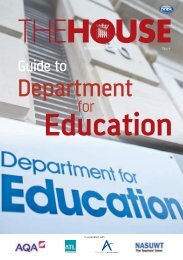Oracy
2fcBkno
2fcBkno
You also want an ePaper? Increase the reach of your titles
YUMPU automatically turns print PDFs into web optimized ePapers that Google loves.
Cognition<br />
Pupils’ cognitive development is a social as well as a biological process,<br />
and spoken language plays a critical role in this development. 76,77,78<br />
“It’s the true foundation of<br />
learning” Professor Frank Hardman<br />
xvi<br />
Recent research in the cognitive sciences suggests that: 79<br />
• Knowledge is constructed and developed through social interaction<br />
• Spoken language helps us construct meaning of the world around<br />
us, and of abstract ideas and concepts<br />
Neuroscientific research adds to the evidence base in this area.<br />
Between infancy and adulthood the brain quadruples in size and<br />
this is largely driven by ‘synaptogenesis’, the process whereby new<br />
connections form in the brain. 80 Talk fuels these processes and<br />
therefore plays a crucial role both in developing pupils’ ability to<br />
think, but also in building the brain itself. 81 Goswami argues that<br />
language (and particularly spoken language) plays a critical role<br />
in supporting memory development in children. 82<br />
“We learn to think through<br />
oral language, [so oracy is<br />
about] advancing individual<br />
capacity for productive,<br />
rational and reflective<br />
thinking” Professor Frank Hardman<br />
xvii<br />
“Talk allows you to construct and<br />
then reconstruct ideas, which is the<br />
major way in which we learn”<br />
Professor Maurice Galton xix<br />
“Verbalising ideas and<br />
concepts is a way to<br />
understanding them as well”<br />
Duncan Partridge, Director of<br />
Education, ESU xviii<br />
A smaller proportion of teachers in our sample highlight the<br />
cognitive benefits of oracy compared to linguistic or social<br />
benefits. Many of the secondary and FE teachers we spoke to<br />
recognise oracy’s importance in supporting cognition, but feel<br />
some colleagues may focus their attention on pupils’ reading<br />
and writing in order to achieve this, to the detriment of their<br />
oral development.<br />
“The best is when we’re in<br />
projects and we’re in groups<br />
and one person says something<br />
and another person can maybe<br />
improve it”<br />
Zara, year 6 pupil,<br />
Eastwood Primary School<br />
Several teachers feel talk is fundamental to quality<br />
metacognition, which involves pupils planning, monitoring<br />
and evaluating their learning. The educational benefits of<br />
metacognition are well established, and can help pupils<br />
make on average eight additional months’ progress. 83<br />
Talk is a critical part of this process.<br />
It is also important to ‘talk about talk’ specifically, as this<br />
helps teachers and pupils improve the quality of oracy<br />
in their classrooms.<br />
“[Make] sure that the purpose of talk is really aligned<br />
with that reflection that you then do on the talk, and …<br />
that pupils are really aware of what the purpose of the<br />
talk is and how that will affect the way that they talk<br />
as well”<br />
Amy Gaunt, Head of <strong>Oracy</strong> Primary, School 21<br />
“Particularly when you’re going into the<br />
higher areas of what are traditionally seen<br />
as more sciencey subjects, I really like –<br />
particularly in areas like quantum physics or<br />
even relativity – seeing that there are no real<br />
answers, and being able to try and explain<br />
that using words rather than using figures.<br />
Because in certain areas in physics and<br />
certain areas in maths you can’t explain it<br />
using real numbers, and you can’t explain<br />
it using formulae, so that area of speaking<br />
and listening really excites me”<br />
Daniel, year 13 student, King Edward VI School<br />
xvi<br />
Key informant interview.<br />
xvii<br />
Key informant interview.<br />
xviii<br />
Key informant interview.<br />
xiv<br />
Key informant interview.<br />
33




